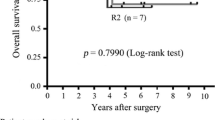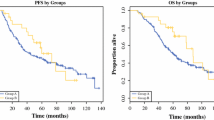Abstract
The prognosis of metastatic gastrointestinal stromal tumor (GIST) has improved since the introduction of imatinib mesylate; however, acquired resistance has been reported, so alternative treatment option is needed. We evaluated the efficacy of hepatectomy for metastatic GIST. Six patients with liver metastases from GIST underwent hepatectomy. Four were treated with imatinib mesylate before hepatectomy, and all the patients were treated with imatinib mesylate after hepatectomy. Patients were followed-up for a mean duration of 113.5 months after hepatectomy. Complete resection was accomplished in four patients, with incomplete resection performed in the remaining two patients due to peritoneal dissemination. One patient with incomplete resection died 10 months after surgery. One patient with complete resection has survived without disease progression since initial hepatectomy. The remaining four patients with progressive disease during imatinib mesylate treatment developed tumor recurrence and three of them underwent a second hepatectomy. These three patients underwent complete resection during repeat surgery. In total, three patients died during the follow-up period, all of whom had tumors of small intestine origin. Primary tumor site (small intestine vs. others) was identified as a risk factor of mortality (P = 0.02). Although not statistically significant, there was a trend toward better outcomes in patients with exon 11 mutations. Surgical resection for metastatic GIST was shown to be effective and needed to achieve a better prognosis. Repeat hepatectomy demonstrated efficacy in selected patients. Hepatectomy should be considered based on tumor characteristics such as primary tumor site and c-KIT mutation status.


Similar content being viewed by others
References
DeMatteo RP, Lewis JJ, Leung D et al (2000) Two hundred gastrointestinal stromal tumors: recurrence patterns and prognostic factors for survival. Ann Surg 231(1):51–58
Joensuu H, Roberts PJ, Sarlomo-Rikala M et al (2001) Effect of the tyrosine kinase inhibitor STI571 in a patient with a metastatic gastrointestinal stromal tumor. N Engl J Med 344(14):1052–1056
Demetri GD, von Mehren M, Blanke CD et al (2002) Efficacy and safety of imatinib mesylate in advanced gastrointestinal stromal tumors. N Engl J Med 347(7):472–480
DeMatteo RP, Maki RG, Singer S, Gonen M, Brennan MF, Antonescu CR (2007) Results of tyrosine kinase inhibitor therapy followed by surgical resection for metastatic gastrointestinal stromal tumor. Ann Surg 245(3):347–352
Raut CP, Posner M, Desai J et al (2006) Surgical management of advanced gastrointestinal stromal tumors after treatment with targeted systemic therapy using kinase inhibitors. J Clin Oncol 24(15):2325–2331
Schurr P, Kohrs D, Reichelt U et al (2009) Repeated surgery improves survival in recurrent gastrointestinal stromal tumors: a retrospective analysis of 144 patients. Dig Surg 26(3):229–235
Mussi C, Ronellengfitsch U, Jakob J et al (2010) Post-imatinib surgery in advanced/metastatic GIST: is it worthwhile in all patients? Ann Oncol 21(2):403–408
Blanke CD, Rankin C, Demetri GD et al (2008) Phase III randomized, intergroup trial assessing imatinib mesylate at two dose levels in patients with unresectable or metastatic gastrointestinal stromal tumors expressing the kit receptor tyrosine kinase: S0033. J Clin Oncol 26(4):626–632
Prenen H, Cools J, Mentens N et al (2006) Efficacy of the kinase inhibitor SU11248 against gastrointestinal stromal tumor mutants refractory to imatinib mesylate. Clin Cancer Res 12(8):2622–2627
Verweij J, Casali PG, Zalcberg J et al (2004) Progression-free survival in gastrointestinal stromal tumours with high-dose imatinib: randomised trial. Lancet 364(9440):1127–1134
Al-Batran SE, Hartmann JT, Heidel F et al (2007) Focal progression in patients with gastrointestinal stromal tumors after initial response to imatinib mesylate: a three-center-based study of 38 patients. Gastric Cancer 10(3):145–152
Turley RS, Peng PD, Reddy SK et al (2012) Hepatic resection for metastatic gastrointestinal stromal tumors in the tyrosine kinase inhibitor era. Cancer 118(14):3571–3578
Zaydfudim V, Okuno SH, Que FG et al (2012) Role of operative therapy in treatment of metastatic gastrointestinal stromal tumors. J Surg Res 177(2):248–254
Park SJ, Ryu MH, Ryoo BY et al (2014) The role of surgical resection following imatinib treatment in patients with recurrent or metastatic gastrointestinal stromal tumors: results of propensity score analyses. Ann Surg Oncol 21(13):4211–4217
Hasegawa J, Kanda T, Hirota S et al (2007) Surgical interventions for focal progression of advanced gastrointestinal stromal tumors during imatinib therapy. Int J Clin Oncol 12(3):212–217
Heinrich MC, Corless CL, Blanke CD et al (2006) Molecular correlates of imatinib resistance in gastrointestinal stromal tumors. J Clin Oncol 24(29):4764–4774
Nishida T, Kanda T, Nishitani A et al (2008) Secondary mutations in the kinase domain of the KIT gene are predominant in imatinib-resistant gastrointestinal stromal tumor. Cancer Sci 99(4):799–804
Rutkowski P, Bylina E, Klimczak A et al (2012) The outcome and predictive factors of sunitinib therapy in advanced gastrointestinal stromal tumors (GIST) after imatinib failure—one institution study. BMC Cancer 12:107
Sawaki A, Kanda T, Komatsu Y et al (2014) Impact of rechallenge with advanced gastrointestinal stromal tumor after failure of imatinib and sunitinib. Gastroenterol Res Pract 2014:342986. doi:10.1155/2014/342986 (Epub 22 Jan 2014)
Author information
Authors and Affiliations
Corresponding author
Ethics declarations
Conflict of interest
The authors declare that they have no conflict of interest.
Ethical approval
All procedures performed in this study were in accordance with the ethical standards of the institutional research committee and with the 1964 Helsinki declaration and its later amendments or comparable ethical standards. For this type of study formal consent is not required.
About this article
Cite this article
Kawamura, N., Kamiyama, T., Yokoo, H. et al. Hepatectomy for liver metastasis from gastrointestinal stromal tumor in the era of imatinib mesylate: a case series study. Int Canc Conf J 6, 121–125 (2017). https://doi.org/10.1007/s13691-017-0289-7
Received:
Accepted:
Published:
Issue Date:
DOI: https://doi.org/10.1007/s13691-017-0289-7




